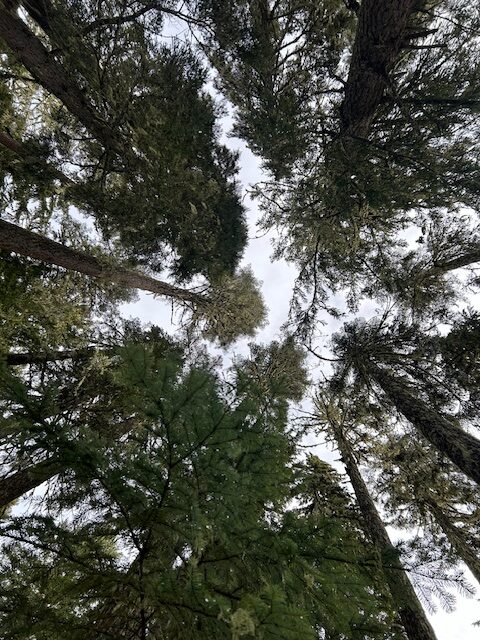Old Growth

By Patricia Crisafulli
A scrap of folded paper flutters from the kitchen island to the floor, then skitters along on a blast of warm air from a floor vent. Early March in Oregon means heat in the early morning, windows open by mid-afternoon. Stooping, Charlotte retrieves the lined paper torn off from the bottom of some utilitarian pad, the kind she writes the grocery list on.
Smoothing out the creases, she reads her husband’s block-letter handwriting—Blue glass fragments of sky on flesh. It’s a nice line, the kind that used to come to him so easily. A second reading catches her breath with recognition—a favorite necklace that, long ago, she wore every day because he’d given it to her. Leaning back against the kitchen island, its hard edge against her spine, she recalls the feel of those cool glass beads against her neck. Back then, she’d wanted everyone to see it, but no one to notice what they’d tried to conceal at first: she, the 24-year-old graduate student; he, the 41-year-old divorced poetry professor with three teenaged children. To everyone’s shock, they married two years later.
Never last—that’s what friends and faculty, alike, had said. Her parents, appalled, had not come to the small wedding in a nondescript chapel. And now look at them, Charlotte thinks with a laugh as she pushes the button on the espresso machine. Forty years later, still together.
Coffee in one hand and the line of poetry in the other, she calls out his name: “Stuart!” His reply comes from behind the door of what had been a small downstairs bedroom, converted to an office after his retirement. Booklined, dust motes dancing in a stream of sunlight, it is the quintessential lair for a man who made his living from the rhythm and rhyme of words.
“Coffee,” he says, excitement in his voice. “Thank you.” A breath follows. “Charlotte.”
She stiffens, fixated on that synaptic delay between him seeing her and saying her name.
Stop it, stop it, stop it, stop it, she chants silently. Stuart does not have dementia, there is no sign of the dreaded “A” disease that she cannot bring herself to say. But he has aged after a long bout of Covid last fall, both his step and speech slower.
There is another truth here, one she tries not to see though it is obvious. Stuart is an eighty-one-year-old man with a handful of health complaints. And she is a sixty-four-year-old woman who feels a decade younger than her age. Never has the gap between them felt like such a chasm.
Her mind hopscotches to a convenient distraction, and all she can think about is seeing Henry. The more she considers the idea, the more she wants to go. Forcing herself to refocus, she hands Stuart the scrap of paper. “You left me a present.”
Stuart reads it, smiles, then slips the paper into the pocket of his flannel shirt, blue and gray plaid, the color of his eyes. Planting his veiny hands on the arms of the chair, he pushes himself to his feet—rounded at the shoulder, but still tall and lean. His first step is hesitant.
Charlotte’s eyes mist, and she doesn’t turn fast enough for him not to notice.
“Come, come.” He reaches for her hand, grazing her fingers before taking hold. “Is it so hard to live with an old man?” His grip is surprisingly tight. “I’m teasing.” Stuart tugs, and she steps toward him and into an embrace.

Lithe in a gauzy skirt that skimmed her ankles, with chandelier earrings that swung with each step, Charlotte crossed the campus on an early autumn day. The year was 1984, and despite George Orwell’s warning, everything seemed possible. After a year of boredom in an office job, she had returned to school to pursue a graduate degree in literature.
Poetry had never been her forte, but the elective fit her schedule, and friends said the professor wasn’t as demanding as others in the literature department. Studying Chaucer in one class and the post-modernist novel in another made for a hefty enough load.
She glanced at the paper in her hand—a one-page syllabus for Poetry 101, Exploration and Explication, along with the professor’s name, contact information, and office hours. She read it again: Stuart Browning Manswell. Why include the middle name, Charlotte wondered—was he trying to evoke Elizabeth Barrett Browning? How do I love thee? Let me count the ways…
Nine weeks later, on their first date, she said exactly that to him. Stuart grinned at her, then explained that his father, Stuart Manswell Sr., had also taught at the university in the sociology department. Stuart used his middle name to avoid confusion, though he also liked the literary allusion. They both laughed at his confession, making every person in that tiny Italian restaurant turn toward them and assess the pretty woman in her 20s, the handsome man in his 40s.
What seemed romantic and a little risky at first became increasingly complicated: Stuart’s visitation schedule; his ex-wife, Jordie, refusing to let Charlotte be with the children; becoming a stepmother at twenty-six to teenagers only ten and twelve years younger than she was. When Jordie was diagnosed five years later with an aggressive form of cancer, Stuart visited her every day and grieved her passing along with their children.
Charlotte almost left him then, feeling squeezed out by a family that had lost its real center when Jordie died. Then one day at the school where she taught, Charlotte opened her classroom door to let a gaggle of 11th graders file out, and Stuart stepped in.
“It’s the storms that make us stronger,” he said. “Jordie and I could never weather them. But with you, it’s different.”
He’d been right, and she’d stayed.

An hour after finding the poetry scrap and delivering Stuart his coffee, Charlotte wipes the crumbs from the kitchen counter. She glances at the clock: quarter after one. Stuart looks up from the small table in the corner where they eat their meals, the dining room unused except when the children and grandchildren visit. He holds half a sandwich, cut on the diagonal. “Going out?”
“You mind?” she asks, all the while knowing he’ll wave her off with a smile and assurances that he has plenty to keep himself occupied. Code words for a nap.
“It’s such a nice day and I haven’t had a good walk in a long while,” Charlotte says.
Stuart takes a bite, chews thoughtfully. “Where’re you headed?”
She hesitates, not wanting to make him feel bad for being unable to make the trek she’s about to take, three miles up a steep trail and three miles back home again. “I want to check on Henry.”
Stuart nods but doesn’t reply right away. “Give him my regards.”

Her backpack is light, containing a water bottle, an apple, and an extra pair of socks in case her feet get wet. To save time, she drives the half-mile to the trailhead, remembering how she and Stuart used to walk the whole way, sometimes bringing a picnic lunch. Stuart promises they’ll hike together again, but Charlotte doubts it. Covid has not only sapped her husband’s strength but also dimmed his spark.
Alone in the car, she lets the tears fall, afraid their time together is coming to an end. But not today, she says, once to herself and then aloud. She shifts her thoughts to her destination: up to the ridge to see Henry.
She knows it is foolish, superstitious even, to think this way, but if Henry is well and hardy then there is still hope for Stuart. In some cosmic way they are all connected in this fractured world. Or so she would like to think—anything to give herself a sense of empowerment in the face of forces against which she is powerless.
Her pace too fast, Charlotte stops to catch her breath beside a rangy long-needled pine. Moss cushions the shadowed side of the trunk, but the bark is gray and deeply grooved where she lays her hand. Fingering that rough exterior, she thinks of how bark is the protective layer, swaddling the growth that happens deep inside, at the tree’s core.
Young growth, she muses, and pats the tree, with a wish for a long and fruitful growing season.
Cracks and gouges carve the path, tracing where water had rushed down the slope. Now it is only a trickle. But three weeks ago, after a fairly mild winter, a four-day tempest of rain, snow, sleet, and wind pelted them. Broken branches still litter the ground.
The grade steepens, and Charlotte feels the burn in her thigh muscles. She works up a sweat, unzips her jacket, and drinks from the water bottle. Henry, she estimates, is about forty-five minutes away.
After about another mile, she scans for landmarks—the old fence post, a wooden sign scrubbed clean of any markings. Charlotte smiles at the memories of how she and Stuart used to guess what it once said. Her favorite of their musings: Snail crossing. Slower traffic keep right. It makes her laugh aloud and the tightness she’s felt all day loosens in her chest.
Then she sees the knobby boulder and the twin trees fused together in a U, which mark the turnoff onto a smaller path, though she can’t see it at first. She hasn’t walked here since last September, before Stuart got sick with Covid for a second time. Finally, she spies a faint indentation in the undergrowth and follows it.

A mountain of pine boughs blocks the path. Charlotte tries to skirt it, but the forest hems in on both sides, forcing her to climb up and over. It isn’t a whole tree, she realizes, but its crown. What’s left of the trunk jabs toward the sky.
As she continues, more downed limbs and broken branches force detours. She wonders about who should know about the storm damage—the forestry service, county parks and recreation? It’s not just clearing the trails; this much deadwood presents an untenable fire hazard.
You cannot worry about everyone and everything.
Stuart’s admonishment echoes in her head. But the alternative of shrugging off all responsibility feels shallow and defeatist. And so she has become hypervigilant in her world, anchored by Stuart and Henry and the imagined connection between them. What a strange little triangle they make.

The forest becomes denser, darker. The trees are bigger, shaggy like old mountain hermits secluded from civilization. They are the old growth, those rare conifers that have stood for centuries. Each an ecosystem unto itself, home and host to birds, squirrels, and insects, they sequester carbon and anchor the soil. In Charlotte’s mind, they do even more—containing the history of the forest, long before colonization. Their very presence helps ensure the future of this corner of the planet, still green, still growing. Charlotte lingers a moment with these holy hermits of the woods, keeping their vigil.
Her heart pounding, she emerges into a small clearing where, years before, two toppled trees created an opening that has since grown up with smaller seedlings. From there she can see Henry—a nickname bestowed on the tree when she and Stuart discovered him twenty years ago.
His massive lower boughs spread across the ground, too heavy to reach toward the sky. Henry’s crown rises far above her head, so high she must arch her back and tip her chin upward until it feels like she is upside down.
Four hundred years old—or so their friend, who retired from forestry service, estimated after seeing their photos of Henry. Stepping over branches, twigs, and pinecones scattered like tributes at Henry’s base, Charlotte makes her way to the massive trunk, at least ten feet around. Opening her arms, she presses her cheek against the bark that picks and scratches at her skin. The embrace is uncomfortable, but she lingers—listening, hoping, wishing, praying for some kind of sign to take back to Stuart.
Branches creak in the wind—not a rocking chair rhythm, but the groans that make Charlotte think of stiffened joints. Suddenly Henry seems old and frail, ready to topple. Then a gust shakes the tree, and needles fall into her hair, as if to get her attention.
She listens again, more intently this time, as Henry growls into the wind, telling his tale of all he has seen and endured—raging weather, blistering heat, lightning strikes, loggers that might have felled him except for the difficulty of getting his bulk down the steep slope, forest fires that came within twenty miles of this ridge. And still he stands, the majesty of old growth.
Charlotte presses her lips against the bark and closes her eyes, whispering her thanks. Then she sets off back down the trail to get home in time for supper.


